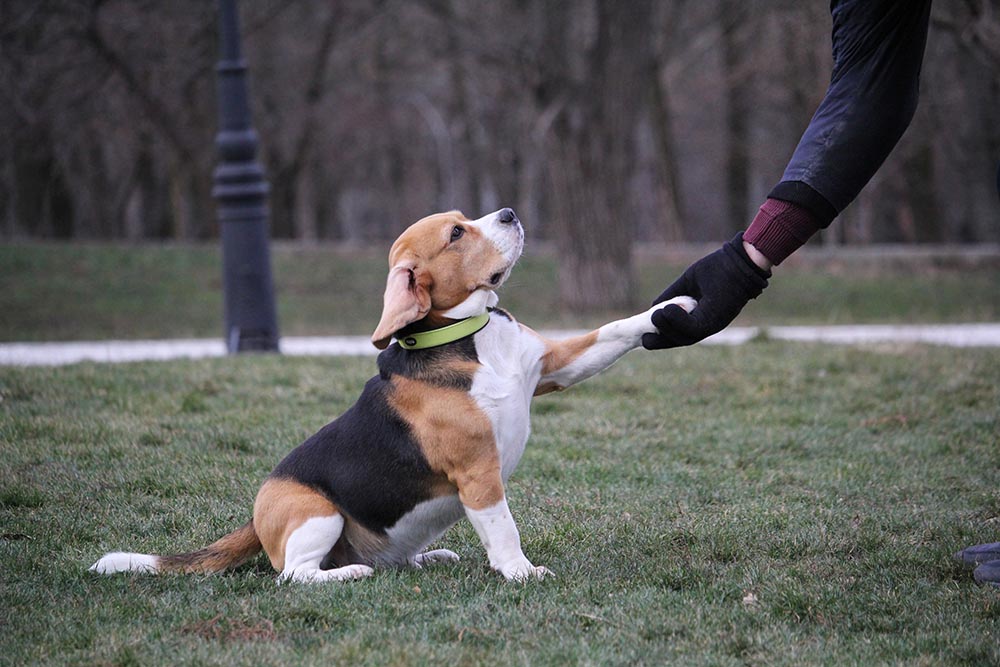Beagles, with their adorable appearance and friendly nature, are a popular choice for many dog lovers. However, training a beagle can be quite a challenge. Despite their intelligence and eagerness to please, beagles are known for their independent and stubborn nature, making them notoriously difficult to train.
One of the main reasons why beagles are hard to train is their strong sense of smell. Bred for hunting, beagles have an exceptional olfactory ability, which can often distract them from their training. Their noses are so powerful that they can easily get sidetracked by interesting scents, making it difficult to keep their attention focused on commands or tasks at hand. This innate hunting instinct can make training sessions frustrating for both the owner and the beagle.
Training a beagle can be challenging due to their independent nature and strong scenting abilities. Beagles are easily distracted when they pick up an interesting scent, making it harder to keep their focus during training sessions. Additionally, their stubbornness and strong will can make them resistant to following commands. However, with patience, consistency, and positive reinforcement, beagles can be successfully trained. Establishing clear boundaries and using rewards can help motivate and engage them in the training process.
The Challenges of Training Beagles
Beagles have a reputation for being stubborn and difficult to train. Many owners find themselves questioning why beagles are so resistant to training. Despite their intelligence and friendly nature, these small hounds can present unique challenges when it comes to obedience and behavior training. In order to understand why beagles are so hard to train, it’s important to delve into their breed characteristics and history.
So, why exactly are beagles so hard to train? Let’s explore some of the key reasons behind their training difficulties:
1. Highly Scent-Driven Instincts
Beagles are scent hounds, which means they have a highly developed sense of smell. This trait is deeply ingrained in their DNA and has been honed through centuries of breeding for their hunting capabilities. While their exceptional olfactory abilities make them excellent hunting companions, it can pose challenges in a training setting.
When a beagle catches a whiff of an interesting scent, their instinctual drive kicks in, causing them to become focused and easily distracted. This strong scenting instinct can make it difficult to get their attention or keep them focused on training commands, particularly in environments with a lot of enticing smells.
2. Independent Nature
Beagles are known for their independent nature. They were historically bred to work in packs while hunting, which required them to make decisions and problem-solve independently. This independent streak can manifest as stubbornness during training sessions.
Beagles are not dogs that naturally defer to their owners or consistently seek approval. They prefer to follow their own instincts and explore their surroundings. This independence can make them less motivated to please their owners and more resistant to obedience training.
3. Strong Prey Drive
Another characteristic that makes beagles hard to train is their strong prey drive. As hunting dogs, they have an inherent urge to chase small animals, such as rabbits or squirrels. This prey drive can make them easily distracted by movement and difficult to control in outdoor training environments.
Beagles may be prone to pulling on leashes or darting after interesting scents or creatures during walks or training sessions. Their intense focus on potential prey can override their obedience training, making it challenging to redirect their attention back to the training task at hand.
4. Short Attention Span
Beagles have a reputation for having a relatively short attention span. While they have the capacity to learn and understand commands, their ability to maintain focus and attention for extended periods may be limited compared to some other breeds.
This short attention span can make the training process more challenging, as beagles may quickly lose interest or become easily distracted by their environment. It’s important for trainers to keep training sessions short and engaging to accommodate their attention span and prevent boredom.
Training Tips for Beagles
While beagles may present unique training challenges, it’s not impossible to train them effectively. With the right approach and consistent training techniques, you can help your beagle become a well-behaved and obedient companion. Here are some training tips specifically tailored for beagles:
1. Use Positive Reinforcement
Positive reinforcement is an essential training technique for beagles. Reward-based training methods that involve praise, treats, and playtime can be highly effective in motivating your beagle to comply with commands and behaviors. Focus on rewarding good behavior rather than punishing unwanted behavior.
Beagles respond well to positive reinforcement and are more likely to repeat behaviors that result in rewards. Incorporate treats or verbal praise when your beagle successfully follows a command or exhibits good behavior. This positive association will help them understand what is expected of them and make training sessions more enjoyable for both of you.
2. Keep Training Sessions Short and Engaging
Beagles can easily become bored or distracted during long training sessions. To keep them engaged and focused, keep the training sessions short, typically between 10 to 15 minutes. Break down the training into small, manageable tasks and provide frequent breaks for play and exploration.
Introduce variety into the training sessions by incorporating different exercises and commands. This will help stimulate their mind and prevent monotony. Additionally, finding ways to make training sessions interactive and fun, such as using puzzle toys or incorporating playtime, can increase their motivation and enjoyment of the training process.
3. Start Early Socialization
Early socialization is crucial for all dogs, including beagles. Expose your beagle to a wide range of people, animals, and environments from a young age to help them become comfortable and well-adjusted. This can minimize behavioral issues and make future training sessions more successful.
Enroll your beagle in puppy socialization classes or arrange playdates with other well-behaved dogs. Introduce them to a variety of sights, sounds, and experiences in controlled and positive situations. This early exposure will help prevent fear-based behaviors and anxiety that can hinder their training progress.
4. Use Consistent Commands and Routines
Consistency is key when training beagles. Use clear and concise commands that are easy for them to understand. Maintain consistency in your training cues, tone of voice, and hand signals. Be patient with your beagle and give them time to associate the command with the desired behavior.
Establishing a routine for feeding, walking, and training can also benefit beagles. They are creatures of habit and thrive in environments with predictable schedules. Having a consistent routine will help them feel more secure and make training sessions more effective.
Conclusion
While beagles may present unique challenges in the training process, their intelligence and friendly nature make them capable of learning and becoming well-behaved companions. Understanding their breed instincts, using positive reinforcement, and providing consistent training will help you overcome the obstacles and ensure a successful training experience with your beagle.
Comparison of Training Difficulty: Beagles vs. Other Breeds
| Breed | Training Difficulty |
|---|---|
| Beagle | Challenging |
| Labrador Retriever | Relatively Easy |
| Border Collie | Highly Trainable |
| Poodle | Easier |
Key Takeaways: Why Are Beagles So Hard to Train?
- Beagles have a strong scenting instinct, which can distract them from training.
- They are independent thinkers and may choose to ignore commands.
- Beagles are easily distracted by smells and may become unresponsive during training sessions.
- They have a stubborn and strong-willed nature, making them less inclined to obey commands.
- Consistency, patience, and positive reinforcement are key when training a Beagle.
Frequently Asked Questions
Beagles are known to be a bit stubborn when it comes to training. Their independent nature and strong scenting instincts can make training a challenge. However, with patience, consistency, and the right training methods, you can successfully train your beagle. Here are some common questions and answers about why beagles can be hard to train.
1. Are beagles hard to train compared to other dog breeds?
While every dog is unique and training difficulties can vary, beagles are often considered to be more challenging to train compared to some other dog breeds. Their strong hunting instincts and curiosity can cause them to be easily distracted and stubborn. They tend to follow their noses and can become completely engrossed in scents, making it difficult to get their attention during training sessions.
However, with proper training techniques, consistency, and positive reinforcement, beagles can be trained effectively. It just may require a bit more patience and persistence compared to other breeds.
2. Can beagles be trained to obey basic commands?
Yes, beagles can certainly be trained to obey basic commands. However, it may take more time and effort compared to other breeds. Beagles are intelligent dogs, but their independent nature can make them more resistant to obedience training. It is important to use positive reinforcement techniques, such as rewards and treats, to motivate them during training sessions.
Consistency is key when training beagles. Short, frequent training sessions that are fun and engaging can help keep their attention and make the training process more enjoyable for both you and your beagle.
3. Do beagles have a strong prey drive that affects their trainability?
Yes, beagles are bred for hunting and have a strong prey drive. Their scenting instincts are highly developed, and they are known for their ability to track scents over long distances. This strong prey drive can sometimes make training difficult, as beagles may become easily distracted by scents and follow their instincts instead of obeying commands.
To overcome this challenge, it is important to create a training environment with minimal distractions and gradually increase the level of difficulty as your beagle progresses. Using scent-based games and activities during training sessions can also help redirect their natural instincts in a positive and controlled manner.
4. Are beagles more challenging to house train compared to other breeds?
House training can be a bit more challenging with beagles compared to some other breeds. Beagles have a strong scenting instinct, and they may be more prone to marking their territory or having accidents indoors. It is important to establish a consistent routine and use positive reinforcement methods, such as rewards and praise, to encourage them to eliminate outside.
Crating can also be an effective tool for house training beagles. By using a crate, you can control their access to the house and prevent accidents. Be sure to give them plenty of opportunities for outdoor bathroom breaks and be patient as they learn to associate the appropriate place to eliminate.
5. How can I make training sessions more effective with my beagle?
To make training sessions more effective with your beagle, consider the following tips:
- Keep training sessions short and frequent to maintain their attention
- Use positive reinforcement techniques, such as treats and praise
- Create a structured training routine and stick to it
- Choose a quiet, distraction-free environment for training
- Use scent-based games and activities to engage their natural instincts
- Be patient, consistent, and persistent in your training efforts

Beagles are known for their strong-willed nature and independent streak, which can make them challenging to train. Their high energy levels and curiosity can sometimes distract them from following commands. Additionally, beagles have a strong hunting instinct, so they may be more inclined to chase after scents or small animals instead of focusing on training. This can make it harder to keep their attention and teach them new commands.
Another factor that contributes to the difficulty in training beagles is their tendency to be easily distracted. Beagles are naturally social and can become more interested in exploring their environment or interacting with other dogs rather than paying attention to their training. Their strong sense of smell also means that they are often focused on following scent trails, which can make it challenging for them to concentrate on training exercises.
